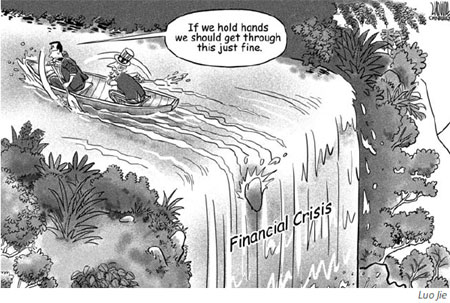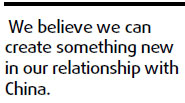


Our grandchildren will measure the Obama administration's foreign policy success by its relationship with China. No international relationship will have greater impact on the 21st century. What does this mean, though, in terms of what the president-elect should do immediately? My advice to President Obama is simple: Go early and go often.
You need to go early to help dispel the strategic mistrust that exists between the US and China, which is the single greatest impediment to solving the problems confronting our two great nations. January 1 is the 30th anniversary of establishing diplomatic relations and will be a day to consider the extraordinary changes in our relations with China and within China itself. The 37th anniversary of issuing the Shanghai Communique and the 30th anniversary of opening the US embassy in Beijing, on February 28 and March 1, respectively, present a symbolic opportunity to change the fabric of the relationship.
And you must go often, because this new cooperative phase in US-China relations will allow us to deal more effectively with the global economic crisis, climate change, energy security, transborder pollution, pandemics, terrorism, the proliferation of nuclear weapons and WMD and the DPRK and Iran crises.
The distrust still coloring US-China relations comes from decades during which the threat of military confrontation over Taiwan loomed large. But times have changed. When I was a student there 36 years ago, a different Taiwan faced a different Chinese mainland across the Straits. In March 2008 the people of Taiwan elected a president committed to closer association with the mainland and set in motion forces promoting further economic and social integration. The mainland is implementing policies that will lead to further reconciliation with the people of Taiwan. America's policy in the region has not adapted to this new reality.
You can change this. On your first trip to China you can lay out how China fits into your new multilateralist foreign policy. You should say unequivocally that the US supports a peace agreement between the Chinese mainland and Taiwan and closer mainland-Taiwan relations are in the best interests of the United States. This would fundamentally alter China's perception of America and allow for progress on numerous fronts.

The new atmosphere would allow for productive discussions on human rights, the successor treaty to the Kyoto accords, reduction of nontariff barriers, increasing China's imports, and participation in the international stabilization fund. Low-hanging fruit for such a visit would be commitments from China to purchase Westinghouse AP 1000 reactors for more of China's 24 nuclear power plants on the drawing board (currently they have contracted for four) and to engage in joint initiatives in clean coal technology and renewable energy. All of these have the added advantage of generating the kinds of jobs we want in America. (Sale of each reactor generates high paying jobs in the US, including thousands in Western Pennsylvania.) Reduced mistrust will create new transparency from China's military planners and improved military to military contacts and China's participation in the thousand-ship navy could begin to be discussed.
By going early and making it clear that not only will you go often but that you welcome China's leadership to visit Washington more often, the leaders of the two most important countries in the 21st century will have an opportunity to build the personal relationship that is essential in dealing with global crises.
You have already become the kind of leader many Americans were waiting for, someone who reminds us to ask big questions. Robert Kennedy was fond of quoting George Bernard Shaw: Some see things as they are and ask why; I dream things that never were and ask why not. With a new leader here at home, we are ready to dream something new for America's role in the world. We believe again that we can create something new in our country and in our relationship with China. The Chinese people and the Chinese leadership eagerly await an American president who knows the 21st century requires a changed relationship with China, and who embraces the opportunities that will bring.
The author is president of the National Committee on United States-China Relations
(China Daily 01/05/2009 page2)













